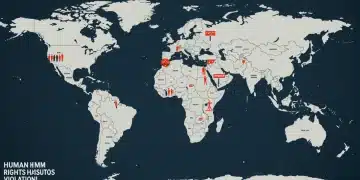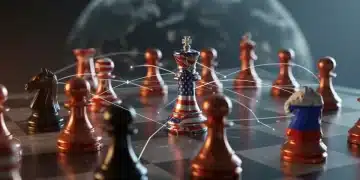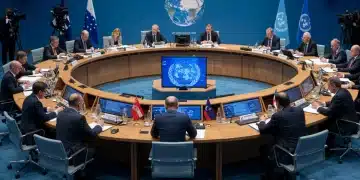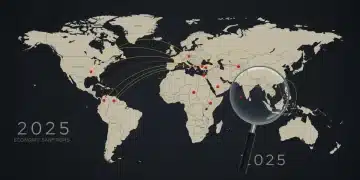New Era Diplomacy: 4 Innovative Approaches Shaping International Relations in 2025
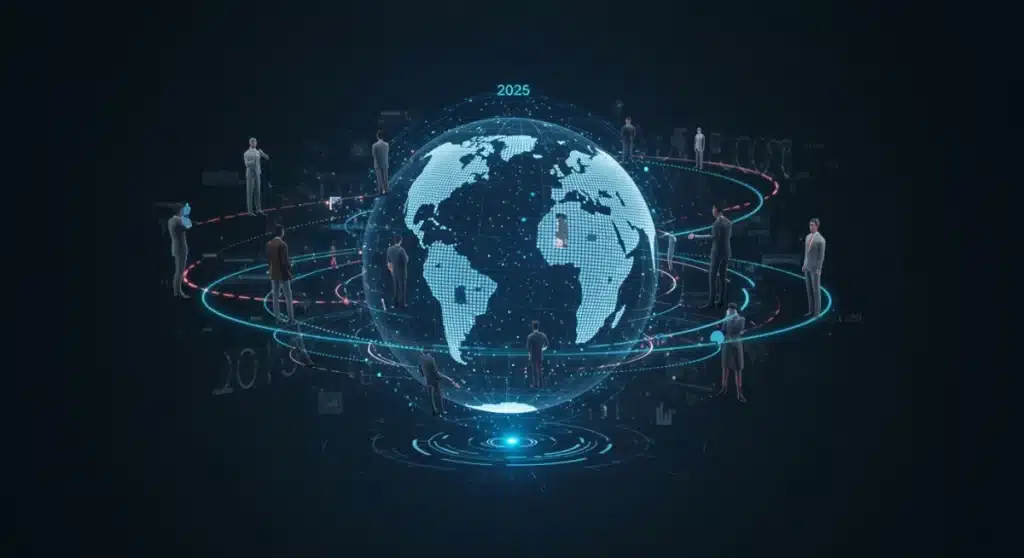
The new era diplomacy of 2025 is characterized by four innovative approaches, integrating practical solutions and recent updates that are profoundly transforming international relations and global governance frameworks.
The New Era of Diplomacy: 4 Innovative Approaches Shaping International Relations in 2025 (PRACTICAL SOLUTIONS, RECENT UPDATES) is rapidly evolving, with new methodologies and strategies emerging to address complex global challenges. This report details the shifts, their implications, and what stakeholders need to understand now to navigate the intricate landscape of international affairs.
Digital Diplomacy: Leveraging Technology for Global Engagement
Digital diplomacy has transcended its initial role as a mere communication tool, becoming a fundamental pillar of international relations in 2025. Governments and international organizations are now strategically deploying digital platforms to foster dialogue, disseminate information, and influence global narratives in real-time. This approach offers unprecedented reach and speed, enabling diplomatic efforts to bypass traditional geographical and logistical barriers.
The integration of artificial intelligence (AI) and big data analytics is further enhancing digital diplomacy. These technologies allow for more nuanced understanding of public sentiment, predictive analysis of geopolitical trends, and automated translation services that break down language barriers. The ability to engage directly with global citizens and non-state actors through social media and other digital channels is reshaping how foreign policy is formulated and executed.
AI and Data-Driven Insights
- Predictive Analytics: Utilizing AI to forecast potential conflict zones or diplomatic impasses, allowing for proactive intervention.
- Sentiment Analysis: Gauging global public opinion on key policy issues to tailor diplomatic messaging effectively.
- Automated Translation: Facilitating immediate communication across diverse linguistic backgrounds, enhancing multilateral discussions.
The shift towards digital platforms also presents challenges, including the spread of disinformation and cyber threats. Diplomatic entities are investing heavily in cybersecurity measures and developing strategies to combat misinformation campaigns, ensuring the integrity and trustworthiness of their digital engagements. This dual focus on innovation and security defines the advanced stage of digital diplomacy.
Multistakeholder Diplomacy: Beyond State-Centric Models
The traditional state-centric model of diplomacy is increasingly complemented, and sometimes challenged, by multistakeholder approaches. In 2025, solving global problems — from climate change to pandemics — requires the active participation of a diverse array of actors, including international organizations, non-governmental organizations (NGOs), private sector entities, and civil society groups. This collaborative framework acknowledges that complex issues demand comprehensive solutions that leverage varied expertise and resources.
Multistakeholder diplomacy emphasizes inclusivity and shared responsibility. By bringing together different perspectives, it aims to create more resilient and broadly accepted agreements. This form of engagement is particularly vital in addressing issues that transcend national borders and require collective action, such as sustainable development goals and humanitarian crises. The United Nations and other global bodies are increasingly adopting these models to enhance the legitimacy and effectiveness of their initiatives.
Key Actors in Multistakeholder Engagements
- International Organizations: Facilitating dialogue and coordinating efforts among diverse parties.
- NGOs and Civil Society: Providing grassroots perspectives, advocacy, and on-the-ground implementation.
- Private Sector: Contributing technological innovation, financial resources, and market-based solutions.
The effectiveness of multistakeholder diplomacy hinges on robust coordination mechanisms and transparent communication. Ensuring all voices are heard and adequately represented is crucial for achieving equitable outcomes and building lasting consensus. This approach signifies a profound evolution in the practice of diplomacy, moving towards a more interconnected and collaborative global governance structure.
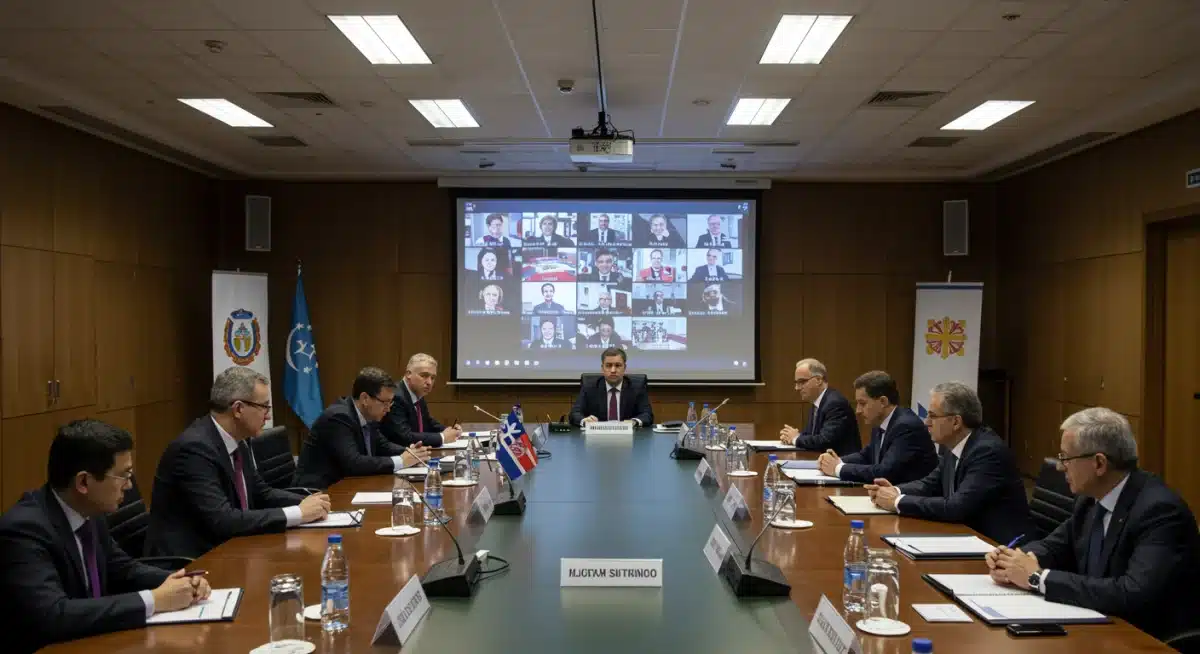
Preventive Diplomacy: Proactive Conflict Resolution
Preventive diplomacy has gained significant traction as a core strategy in the new era diplomacy of 2025, focusing on addressing potential conflicts before they escalate into violence. This proactive approach involves early warning systems, mediation efforts, and confidence-building measures designed to defuse tensions and foster understanding among disputing parties. The emphasis is on identifying root causes of conflict, such as economic disparities, political grievances, or resource scarcity, and implementing targeted interventions.
Recent updates show a greater reliance on sophisticated data analysis and intelligence gathering to predict areas of potential instability. Diplomatic missions are increasingly equipped with specialists in conflict analysis and resolution, working alongside traditional diplomats. This integrated approach allows for more informed decision-making and the deployment of tailored diplomatic tools to prevent crises. For example, economic incentives or cultural exchange programs might be used to reduce friction between communities.
The success of preventive diplomacy often depends on timely intervention and the willingness of all parties to engage in constructive dialogue. International organizations, including regional blocs, are playing a more prominent role in facilitating these early interventions. By investing in prevention, the global community aims to reduce the human and economic costs associated with full-blown conflicts, fostering greater stability and security worldwide.
Citizen and Public Diplomacy: Empowering Non-State Actors
Citizen and public diplomacy are emerging as powerful forces in shaping international relations, moving beyond traditional government-to-government interactions. In 2025, these approaches recognize the significant influence of individuals, cultural exchanges, and public opinion in building bridges between nations and fostering mutual understanding. Public diplomacy leverages media, cultural programs, and educational initiatives to communicate a nation’s values and policies directly to foreign publics, aiming to build goodwill and counter negative stereotypes.
Citizen diplomacy, on the other hand, involves direct interactions between ordinary citizens of different countries, often through educational exchanges, sports, or joint humanitarian projects. These people-to-people connections can create deep and lasting bonds that complement official diplomatic channels. The rise of global travel and digital communication platforms has amplified the reach and impact of citizen-led initiatives, making them indispensable components of modern diplomacy.
Forms of Citizen and Public Diplomacy
- Cultural Exchange Programs: Fostering understanding through arts, music, and traditions.
- Educational Partnerships: Promoting academic collaboration and student mobility.
- Digital Storytelling: Using online platforms to share narratives and connect diverse communities.
The increasing engagement of non-state actors in diplomatic efforts underscores a fundamental shift in how international relations are conducted. Empowering citizens and various public entities to participate in global dialogue strengthens the fabric of international cooperation and builds a more inclusive global society. This bottom-up approach to diplomacy is vital for addressing the shared challenges of the new era diplomacy.
Economic Diplomacy: Intertwining Trade, Investment, and Geopolitics
Economic diplomacy has become an indispensable tool in the new era diplomacy of 2025, where trade, investment, and financial flows are inextricably linked with geopolitical strategies. Nations are increasingly using economic leverage to advance their foreign policy objectives, secure strategic resources, and promote their national interests. This involves negotiating trade agreements, attracting foreign direct investment, and participating in international financial institutions to shape global economic governance.
The focus extends beyond mere commercial transactions to strategic partnerships that build resilience and influence. Countries are engaging in economic diplomacy to diversify supply chains, mitigate economic vulnerabilities, and foster technological collaboration. For example, investments in critical infrastructure in developing nations can serve both economic and strategic purposes, creating dependencies and strengthening alliances. This approach requires a sophisticated understanding of global markets and geopolitical dynamics.
Strategic Economic Tools
- Trade Agreements: Crafting pacts that favor national industries and secure market access.
- Investment Promotion: Attracting capital for key sectors to boost economic growth and innovation.
- Development Aid: Utilizing financial assistance to build influence and foster stability in partner countries.
The intertwining of economic and diplomatic objectives means that trade disputes or investment decisions can have significant geopolitical repercussions. Therefore, economic diplomacy in 2025 is characterized by a careful balance between promoting national prosperity and navigating the complexities of international power dynamics. It is a critical component for any nation seeking to assert its influence on the global stage.
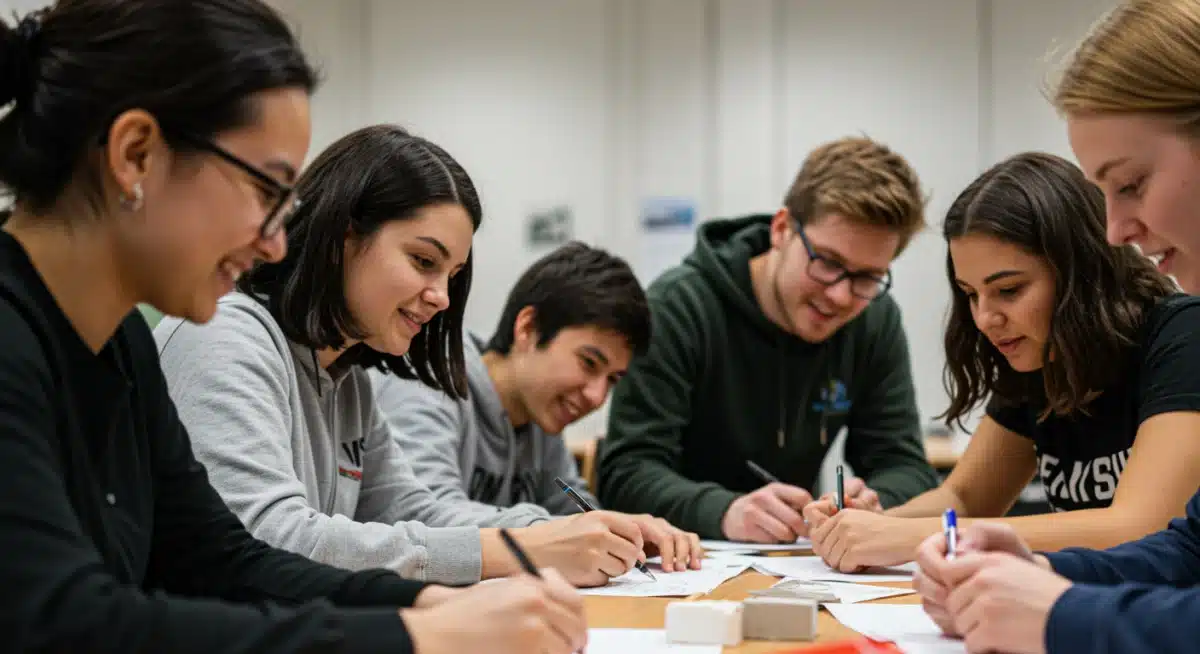
Environmental Diplomacy: Addressing Climate Change and Sustainability
Environmental diplomacy stands as a crucial pillar of the new era diplomacy in 2025, as climate change and ecological sustainability continue to be paramount global challenges. Nations are increasingly recognizing that environmental issues transcend borders, requiring concerted international cooperation. This form of diplomacy involves negotiating international agreements, sharing best practices in sustainable development, and mobilizing resources to combat climate change, biodiversity loss, and pollution.
The urgency of these issues has elevated environmental concerns to the forefront of foreign policy agendas. Diplomatic efforts are focused on fostering consensus on emissions reductions, promoting green technologies, and ensuring equitable transitions to sustainable economies. For example, climate finance, where developed nations support developing countries in their climate action efforts, is a significant area of diplomatic negotiation. This requires complex discussions involving economic aid, technology transfer, and capacity building.
International conferences and summits on climate change, such as the COPs, serve as critical platforms for environmental diplomacy. These gatherings bring together heads of state, environmental ministers, scientists, and civil society representatives to forge commitments and track progress. The increasing involvement of scientific experts in diplomatic processes underscores the data-driven nature of modern environmental negotiations. Effective environmental diplomacy is essential for safeguarding the planet and ensuring a sustainable future for all.
Key Diplomatic Approach |
Brief Description |
|---|---|
Digital Diplomacy |
Leveraging technology and AI for global engagement and narrative shaping. |
Multistakeholder Diplomacy |
Involving diverse actors beyond states for comprehensive problem-solving. |
Preventive Diplomacy |
Proactive measures and early intervention to avert conflicts. |
Citizen Diplomacy |
Empowering non-state actors and public opinion in international relations. |
Frequently Asked Questions About New Era Diplomacy
The new era of diplomacy in 2025 is characterized by a shift towards more innovative, inclusive, and technologically driven approaches. It emphasizes digital engagement, multistakeholder collaboration, proactive conflict resolution, and the empowerment of non-state actors to address complex global challenges effectively.
Digital diplomacy is transforming international relations by enabling real-time global engagement, direct communication with foreign publics, and data-driven insights through AI. It allows for faster policy dissemination, sentiment analysis, and the ability to counter disinformation, making diplomatic efforts more agile and far-reaching.
Multistakeholder diplomacy is crucial because complex global challenges like climate change and pandemics require diverse expertise and resources beyond state actors. It brings together international organizations, NGOs, the private sector, and civil society to forge comprehensive, resilient, and broadly accepted solutions, fostering shared responsibility.
Preventive diplomacy in 2025 focuses on proactively resolving conflicts before they escalate. It employs early warning systems, mediation, and confidence-building measures, often supported by data analytics, to address root causes of instability. This approach aims to reduce the human and economic costs of conflicts by fostering early intervention and dialogue.
Citizen and public diplomacy build global understanding by fostering direct connections between people and communicating national values to foreign publics. Through cultural exchanges, educational programs, and digital outreach, these approaches create mutual goodwill, counter stereotypes, and complement official diplomatic channels, strengthening international cooperation at a grassroots level.
Outlook: Navigating the Evolving Diplomatic Landscape
The evolution of diplomacy into these innovative approaches underscores a fundamental shift in how nations and non-state actors will engage on the global stage. As 2025 unfolds, the interplay between digital tools, diverse stakeholders, proactive conflict resolution, and citizen engagement will define success in international relations. Monitoring the integration of these strategies and their practical outcomes will be crucial for understanding the future of global governance and cooperation. The ability to adapt and innovate in these areas will determine influence and effectively address shared challenges in this complex and interconnected world.
